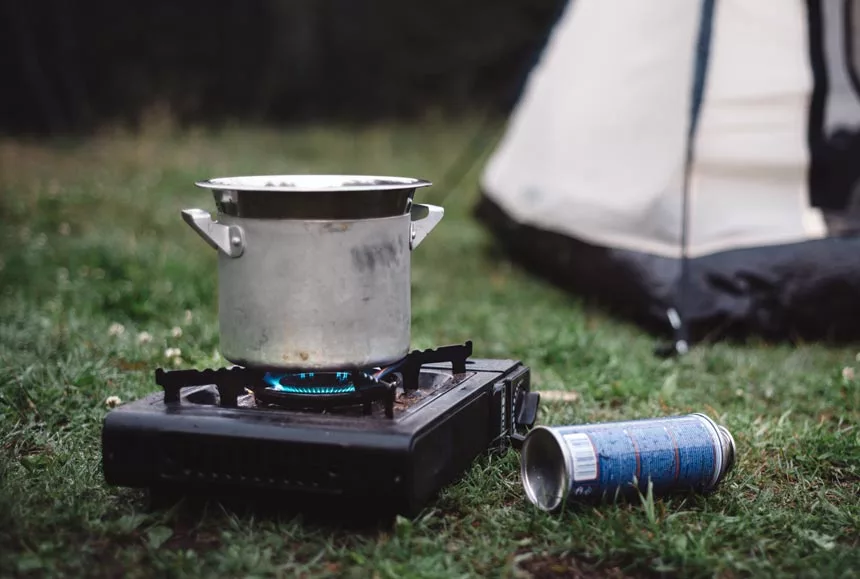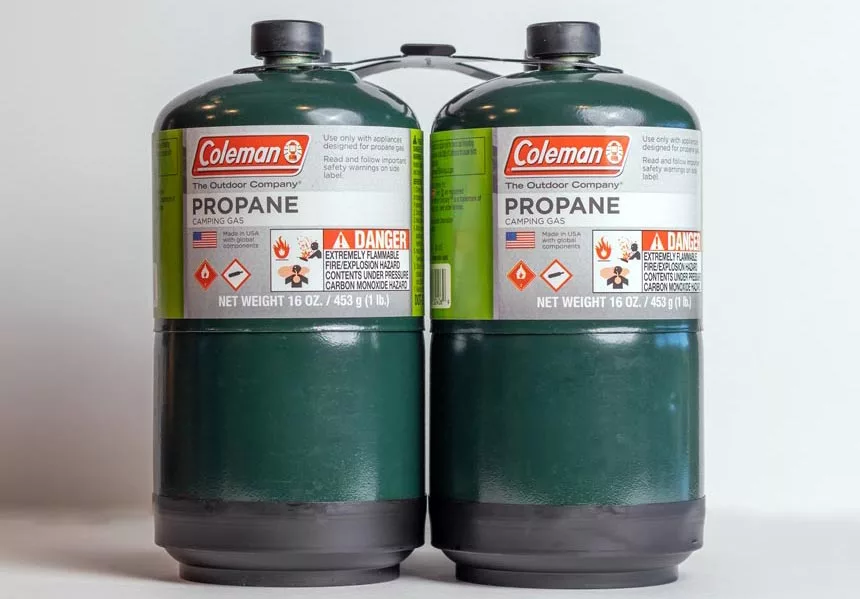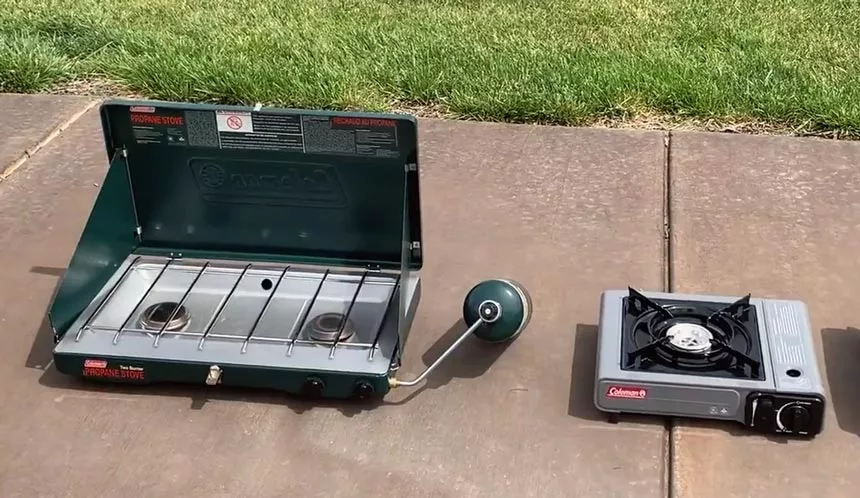When you want to go camping, it is essential to consider which fuel you will use for your camping stove. Propane and Butane are the two most common fuels used by most campers. But Butane vs. Propane, which one is better fuel for a camping stove?
This article will discuss how Butane and Propane work in concrete terms and why they are popular with campers. We’ll also go over the upsides and downsides of each fuel type. It will help you find the one that fits your needs perfectly.
Table of Contents
Butane VS Propane: Differences and Similarities

Propane and Butane are closely related as they’re both highly flammable gases and work-alike for fueling camping heat stoves. But they share some key differences and similarities. Before diving into their differences, it’s essential to comprehend the similarities between these two gases.
Butane and Propane are gaseous hydrocarbons that belong to the primary tribe of the Hydrocarbon formula but come from different product families. This is what makes these gases much similar in their structure as well as functionality.
On the contrary, one of the significant differences between these two fuels is that Propane is denser in volume. It doesn’t tend to leak even when you preserve it in an open container. Whereas, Butane is lighter than air and tends to leak out of containers if they aren’t sealed properly.
Below are some other vital differences and similarities between these fuels, which include,
Summary:
- Both gas types are easily transportable. So, you can often use them to fuel camp stoves, grills, lanterns, and cars.
- Butane and Propane are petroleum-based fuels that generate co2, water, carbon monoxide, and soot when burned.
- Propane is an odorless gas with a transparent appearance. It’s less toxic than Butane tanks (but still deadly in large doses) and will even give heat when applied to a fire source.
- Propane is somewhat expensive, but it can work for every application. It’s also heavy, so it often isn’t an option for camping. On the other hand, Butane is significantly beneficial— with the same energy content. In contrary to Propane, you can store it in a smaller container.
- Propane is a more volatile type of fuel than Butane. So, it has a higher chance of evaporation. This makes it a better option for venturing into the great outdoors, where there’s access to an easy refilling process.
Qualities of a Better Camping Fuel
Camping requires different fuel than what you use at home. That said, you must choose your fuel carefully during a camping trip. For example, the ability to refuel quickly can make the difference between a successful night and a dinner disaster.
There are many factors to take into consideration when selecting your fuel. Namely the following: portability, temperature sensitivity, affordability, and refuel ability. So, consider these quality selections to get the best popular fuel for camping stoves.
1. Temperature Tolerance
Your camping stove fuel should opt for any temperature, especially cold weather. In that case, Propane and Butane share some differences. They will not pass through your stove burners at temperatures under their vapor pressure.
Nothing is as versatile as Propane when it comes to outdoor cooking. Propane is an ideal 4-season camping fuel because it’s safe to use in low temperatures. Its freezing point is the weakest of all the gases. So, you can count on your tanks to deliver fuel even on chilly nights. You can also rely on a Propane canister to heat your tent on a cold winter night.
On the contrary, Butane canisters contain flammable gas liquids appropriate for use in warm weather conditions. When used during the winter months, the liquid inside the butane canister can freeze and render it unusable.
2. Weight
In terms of camping, weight is a significant factor to consider about. Backpacking through the wilderness with heavy fuel cylinders can be a nightmare. Therefore, lightweight fuels are best for camping trips as they don’t weigh you down too much.
You can store liquid Propane in a cylinder, but it’s not very practical. It’s heavy and takes up a lot of space. That’s why you should use convenient Propane tanks instead. They’re easier to store, transport, and use.
However, Butane is less pressurized than Propane and can be stocked in thin canisters. These canisters are a fraction of the size of propane tanks and weigh much lighter. They’re more portable and convenient to store and transport.
3. Fuel Cost
Purchasing an affordable fuel that won’t drain your wallet is another essential factor when deciding between Butane and Propane. Retail prices for these fuels can differ by brand, country, and even specific geographic location.
However, you can estimate the price difference between regular and premium gasoline based on their open market price. In that case, Propane is the more expensive option to go with. But its fuel efficiency and cost-effectiveness make it worth the extra cost.
4. Energy Density
While the fuel cost is essential, the energy it can provide is also critical. When comparing Propane and Butane, weighing the cost per unit weight may be misleading.
For example, if one fuel weighs twice as much as the other but will boil twice as much water, it’s cheaper than you’d expect.
In general, high-density fuels are generally preferred to low-density ones. The energy density of a given amount of fuel is a measurement of how much energy it contains. A cubic foot of natural gas has around 1,015 BTUs.
Butane has a higher energy density than Propane, making it last longer on your stove. When shopping for a butane fuel canister, you need to consider the specific volume.
One pound is equivalent to 2.25 liters (1/8th of a gallon). So, you have to ensure that the volume of the butane bottle you pick is larger than the one you are replacing.
5. Availability
You must also consider fuel availability. You can’t rely on a fuel source that isn’t readily available where you’re camping. In that case, Propane or Butane is a standard product that is easy to find at stores or gas stations.
Propane is more common than Butane because it requires less maintenance and is often found in large tanks. But another reason for the popularity of this gas is that it can be used by more than one application. A propane tank delivers gas for your stove, barbecue grill, and pool heater!
6. Refilling Capability
Refilling a conventional tank means you don’t have to rely on bulky helium tanks on hand. Having a tank that can be refilled is a huge plus for those who frequently camp. That way, you will have enough fuel and can cook without interruption during your trip.
Propane tanks are pretty much easier to refill with the help of a refill adaptor. Read the directions carefully and take your time. Check the states’ regulations that you cross state lines into.
However, Butane is a very flammable and volatile liquid, so you can’t refill the canister once it’s empty. You’ll have to buy an entirely new canister of Butane every time you run out. That somewhat makes these gases expensive and not so environmentally friendly.
7. Compatibility
A portable camping stove can adapt to any fuel as long as you have a connector for your fuel type. Such stoves can also use multifuel connectors. It lets you choose between Propane and Butane with ease.
However, Propane and Butane aren’t interchangeable. They are different fuels that have different chemical properties. So, you cannot swap them without an additional converter.
For instance, Propane has a higher vapor pressure than Butane. Then, it can create forceful jets and high-pressure flames more easily.
You’ll need a valve converter to connect a Butane canister with a screw-style Propane stove. This is an easy upgrade if your dual-fuel stove comes with a hose. If you want a Butane canister, you’ll need to purchase an aftermarket Lindal Valve converter.
Butane Vs Propane: Boiling Point
If you wonder whether they have any differences in their boiling points, they do. Even though they are composed of the same chemical formula, their different molecular structures impact their boiling points.
The boiling point of a liquid is the temperature at which it boils and turns into a gas. It depends on pressure and is usually specified at a standard sea level pressure.
Butane and Propane maintain the following boiling point:
- Butane’s boiling point is 30.2°F.
- Propane’s boiling point is -43.6°F.
Propane is an excellent choice for cold climates as it has a reduced boiling point. This means Propane is perfect for more frigid environments. It won’t freeze like other fuels and will still work as efficiently!
In contrast, Butane can provide good company in hot weather camping as it contains a much higher boiling point than Propane.
Which Fuel Type to Select – Propane vs Butane?

Check on each fuel type from different angles. Run them on trial by cooking one to two meals before you leave for camping. It will help you understand which one fits your needs.
According to us, Propane is the most valuable and effective fuel for camping. When propane canisters aren’t plugged into a fuel line, they tend to self-seal, keeping gas from escaping. They also don’t have a trigger, so you don’t have to worry about spilling fuel in your tent, which is excellent for convenience and safety.
However, for your satisfaction, you should primarily consider the three following factors mentioned below,
- Focus on the weight. If you are backpacking, consider taking Butane fuel as it’s lightweight to carry. Propane can be an excellent option to have in terms of car camping.
- If weight is not a factor and you plan to spend the entire weekend camping in frigid temperatures, Propane fuel is your best option. However, this fuel may be too heavy to carry if your trip involves hiking or paddling. So, try sticking with the Butane canister fuel instead.
- Next, consider the weather in which you will be camping. As mentioned earlier, Propane is incredible in winter camping. Besides that, you can carry the Butane fuel in summer.
The summary of the full discussion on different criteria is below:
| Compare Based On | Propane | Butane |
|---|---|---|
| Temperature Tolerance | Good for All Season Camping | Good for Summer Camping |
| Cylinder Weight | Heavy Weight | Lightweight |
| Fuel Cost | Expensive than Butane | Cheaper than Propane |
| Energy Density | 493 kg/m³ | 573 kg/m³ |
| Availability | Commonly Available | Commonly Available |
| Refilling Capability | Yes | No |
| Compatibility | Most Compatible | Compatible with a specific item |
Frequently Asked Questions
Conclusion
The choice between Propane and Butane is a challenging one. But when you know all the pros and cons of each fuel type, you can easily choose the best-suited one.
Also, don’t forget to go for a stove that can suit your needs. If you aren’t going to go fully equipped with a home kitchen, select an accessible cooking contraption like a single-burner stove. Consider the weight of the portable gas stove you want to buy. Keep the weight in mind if you carry all your equipment on your back.
Thanks for reading this article. We hope it was helpful and helped you learn more about camping fuels. Don’t hesitate to contact us if you have any suggestions or tips regarding content that we maybe missed out on.



